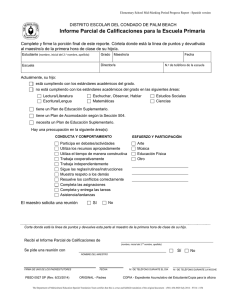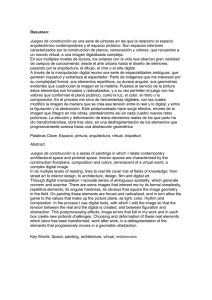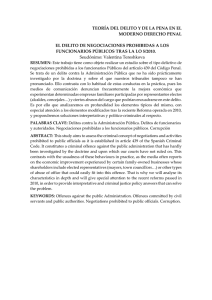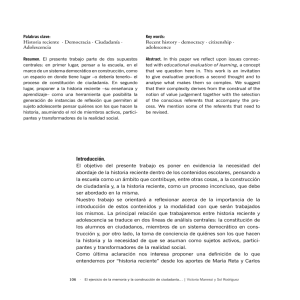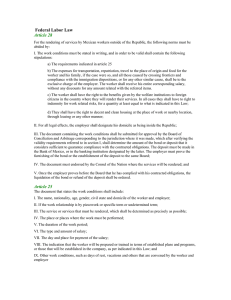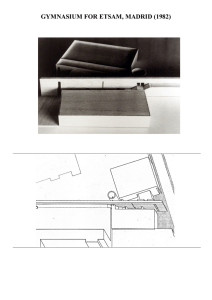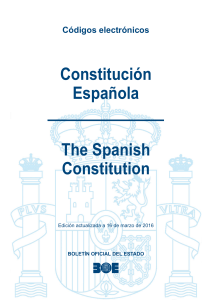Proposed Spanish Ancillary Right (“Snippet Tax”), Article 32.2
Anuncio
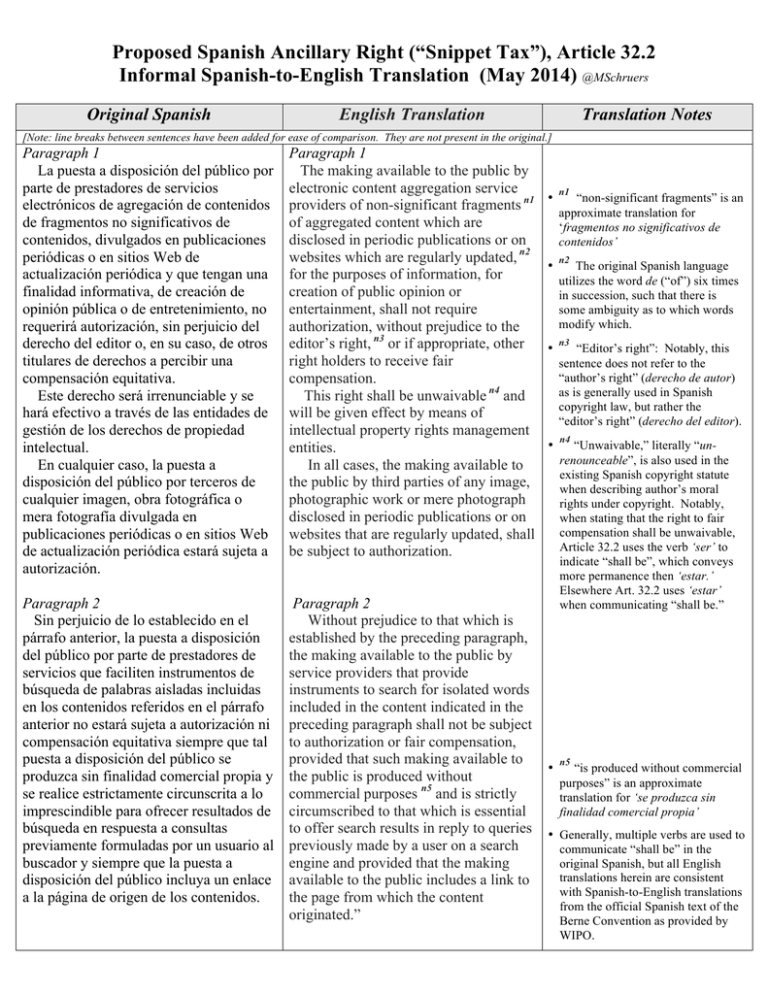
Proposed Spanish Ancillary Right (“Snippet Tax”), Article 32.2 Informal Spanish-to-English Translation (May 2014) @MSchruers Original Spanish English Translation Translation Notes [Note: line breaks between sentences have been added for ease of comparison. They are not present in the original.] Paragraph 1 La puesta a disposición del público por parte de prestadores de servicios electrónicos de agregación de contenidos de fragmentos no significativos de contenidos, divulgados en publicaciones periódicas o en sitios Web de actualización periódica y que tengan una finalidad informativa, de creación de opinión pública o de entretenimiento, no requerirá autorización, sin perjuicio del derecho del editor o, en su caso, de otros titulares de derechos a percibir una compensación equitativa. Este derecho será irrenunciable y se hará efectivo a través de las entidades de gestión de los derechos de propiedad intelectual. En cualquier caso, la puesta a disposición del público por terceros de cualquier imagen, obra fotográfica o mera fotografía divulgada en publicaciones periódicas o en sitios Web de actualización periódica estará sujeta a autorización. Paragraph 1 The making available to the public by electronic content aggregation service providers of non-significant fragments n1 of aggregated content which are disclosed in periodic publications or on websites which are regularly updated, n2 for the purposes of information, for creation of public opinion or entertainment, shall not require authorization, without prejudice to the editor’s right, n3 or if appropriate, other right holders to receive fair compensation. This right shall be unwaivable n4 and will be given effect by means of intellectual property rights management entities. In all cases, the making available to the public by third parties of any image, photographic work or mere photograph disclosed in periodic publications or on websites that are regularly updated, shall be subject to authorization. Paragraph 2 Sin perjuicio de lo establecido en el párrafo anterior, la puesta a disposición del público por parte de prestadores de servicios que faciliten instrumentos de búsqueda de palabras aisladas incluidas en los contenidos referidos en el párrafo anterior no estará sujeta a autorización ni compensación equitativa siempre que tal puesta a disposición del público se produzca sin finalidad comercial propia y se realice estrictamente circunscrita a lo imprescindible para ofrecer resultados de búsqueda en respuesta a consultas previamente formuladas por un usuario al buscador y siempre que la puesta a disposición del público incluya un enlace a la página de origen de los contenidos. Paragraph 2 Without prejudice to that which is established by the preceding paragraph, the making available to the public by service providers that provide instruments to search for isolated words included in the content indicated in the preceding paragraph shall not be subject to authorization or fair compensation, provided that such making available to the public is produced without commercial purposes n5 and is strictly circumscribed to that which is essential to offer search results in reply to queries previously made by a user on a search engine and provided that the making available to the public includes a link to the page from which the content originated.” • • • • • n1 “non-significant fragments” is an approximate translation for ‘fragmentos no significativos de contenidos’ n2 The original Spanish language utilizes the word de (“of”) six times in succession, such that there is some ambiguity as to which words modify which. n3 “Editor’s right”: Notably, this sentence does not refer to the “author’s right” (derecho de autor) as is generally used in Spanish copyright law, but rather the “editor’s right” (derecho del editor). n4 “Unwaivable,” literally “unrenounceable”, is also used in the existing Spanish copyright statute when describing author’s moral rights under copyright. Notably, when stating that the right to fair compensation shall be unwaivable, Article 32.2 uses the verb ‘ser’ to indicate “shall be”, which conveys more permanence then ‘estar.’ Elsewhere Art. 32.2 uses ‘estar’ when communicating “shall be.” n5 “is produced without commercial purposes” is an approximate translation for ‘se produzca sin finalidad comercial propia’ • Generally, multiple verbs are used to communicate “shall be” in the original Spanish, but all English translations herein are consistent with Spanish-to-English translations from the official Spanish text of the Berne Convention as provided by WIPO.
